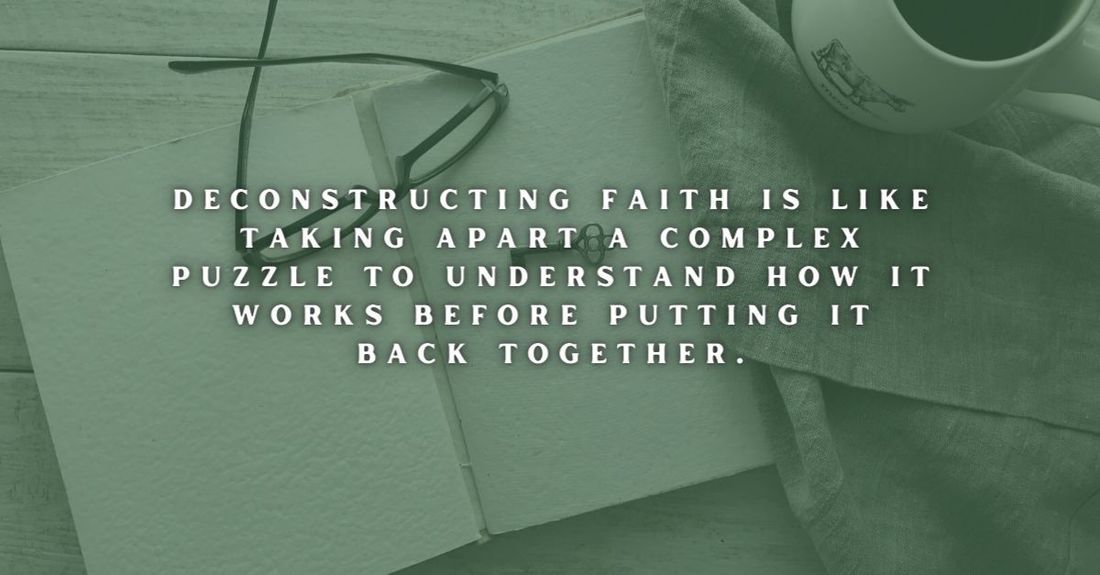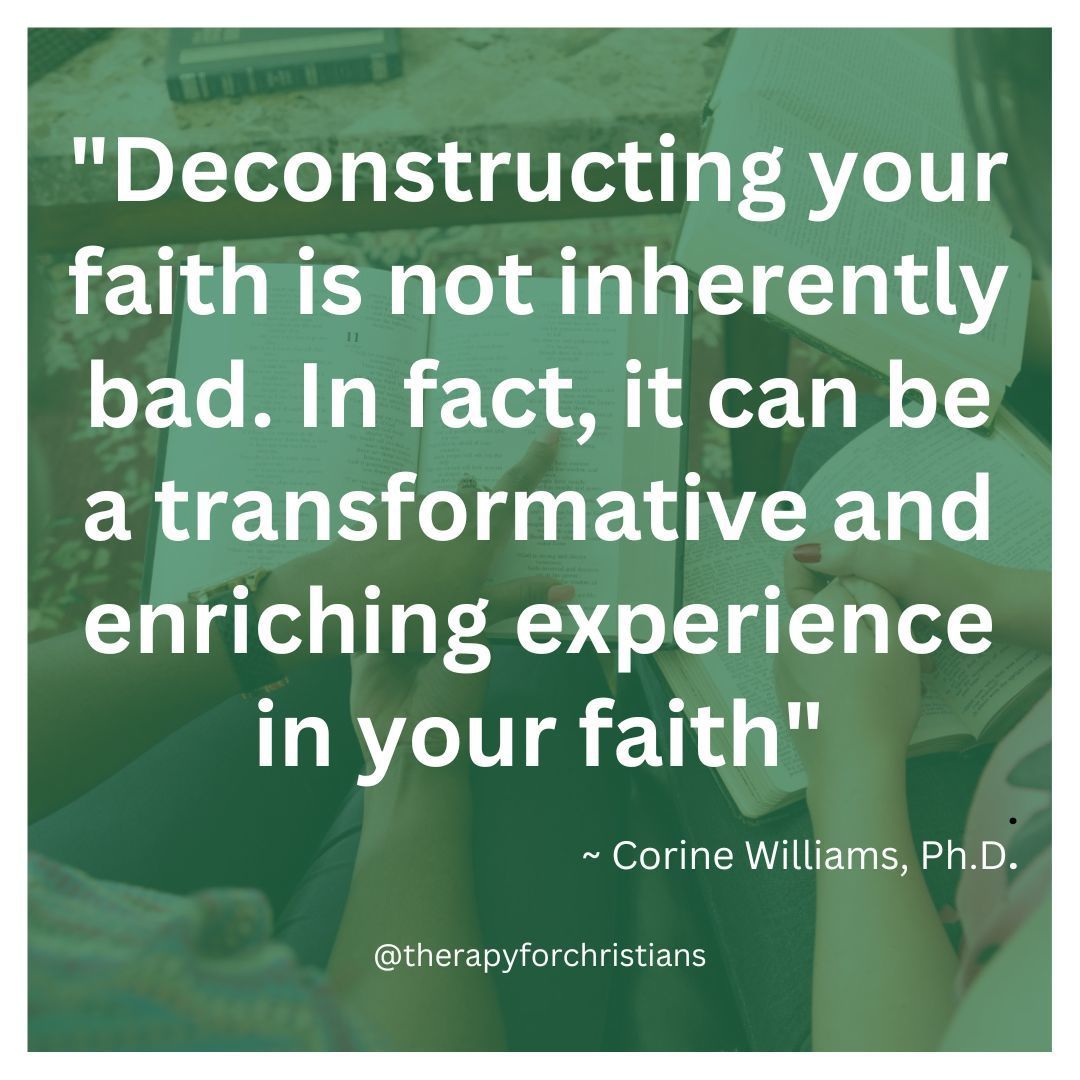
In recent times, the idea of "deconstruction" in religious circles has become a prominent topic of discussion. Deconstruction in religious terms refers to a process where people choose to question their biblical faith and all that the faith community has taught them.
Deconstructing faith, in simpler terms, means examining and reevaluating your beliefs, particularly your religious ones. It's like taking apart a complex puzzle to understand how it works before putting it back together.

Many Christians have found themselves on this introspective journey, questioning parts of their faith that they once held without hesitation. They’re in this process of seeking a deeper and more authentic understanding of their beliefs and spirituality.
This phenomenon has sparked a huge variety of debates and conversations within many faith communities. Some see it as a necessary and healthy step for spiritual growth, while others are found expressing concerns about its implications for the Christian faith.
In this blog, we will delve into what faith deconstruction is, where it originates, why people experience it, what the Bible says about it, and how to navigate this journey healthily and constructively.)-(1).jpg)
What is deconstruction in religious terms?
In religious terms, deconstruction refers to the process of critically examining and reevaluating your faith and religious beliefs. It involves questioning your long-held convictions, doctrines, and interpretations of religious texts.
This process naturally arises when you encounter challenging questions, doubts, or discrepancies within your faith. Deconstruction can encompass a wide range of topics, such as theological doctrines, religious practices, moral teachings, and the overall relevance of religion in a modern context.
Deconstruction, in essence, allows you to engage in a deeper exploration of your faith, where you seek to understand its foundational principles and the rationale behind your beliefs. This can involve scrutinizing the cultural and historical contexts in which religious texts were written and reinterpreting their meaning for modern life.
While deconstruction can be a challenging and sometimes unsettling journey, it can ultimately lead to a more profound and authentic faith, as you grapple with your doubts and emerge with a more resilient and personally meaningful faith in Christ.

Where Did ‘Deconstruction' Come From?
The concept of 'deconstruction' in religious and philosophical contexts originated in the mid-20th century and is primarily associated with the work of the French philosopher Jacques Derrida.
Derrida's theory of deconstruction came as a response to structuralism, a dominant intellectual movement in France during the 1950s and 1960s. Structuralism aims to analyze language, culture, and thought by identifying underlying structures and systems of meaning. Derrida challenged this structuralist approach, arguing that it prioritizes binary oppositions and hierarchical structures, often neglecting the complexities of language and thought.
Derrida's deconstruction, introduced in his influential writings, aimed to disrupt traditional modes of philosophical and linguistic analysis. He underlined the inherent ambiguity, fluidity, and multiplicity of language, suggesting that meaning was always subject to interpretation and never fixed.
Deconstruction involves analyzing how texts and language construct meaning, often revealing hidden assumptions, contradictions, and paradoxes within them. Derrida's ideas resonated beyond the realm of philosophy and influenced various fields, including theology and religious studies, where scholars began to apply deconstructive methods to religious texts and beliefs.
In the context of religion, deconstruction evolved as a method for critically analyzing sacred texts, theological doctrines, and religious traditions.
Scholars and theologians started to explore how religious records and beliefs could be deconstructed to reveal layers of interpretation, cultural influences, and contextual biases. This approach sought to challenge conventional religious interpretations and encourage a more nuanced engagement with our faith.
10 Reasons People Are Deconstructing Christianity
There are several reasons why people are deconstructing Christianity. Here are 10 of the most common:
Questioning Beliefs: Some people begin to question their beliefs as they grow older or encounter new information. They start to wonder if what they were taught aligns with their own convictions.
Church Scandals: High-profile church scandals and controversies can deteriorate trust in our churches. Instances of abuse, financial misconduct, or hypocrisy within church culture can lead people to question the authenticity of their faith.
Doctrinal Differences: Disagreements with specific doctrinal teachings or interpretations of scripture can drive people to reevaluate their faith. These theological differences may create cognitive dissonance and prompt a process of deconstruction.
Cultural Shifts: Changing cultural norms and values can challenge traditional religious beliefs. As society becomes more secular or adopts different ethical standards, people may find it difficult to reconcile their faith with these shifts surrounding culture.
Intellectual Exploration: Some people venture on a journey of intellectual exploration, studying philosophy, science, or other belief systems. Exposure to these diverse ideas can lead to a reevaluation of their faith and the desire to deconstruct and reconstruct their beliefs.
Personal Trauma: Experiencing personal trauma, such as loss, illness, or adversity, can cause people to question their faith. They may struggle to reconcile their suffering with their understanding of a loving God, leading to a deconstructive process or losing faith.
Desire for Authenticity: Many people are seeking a more authentic and meaningful faith experience in Christian culture. They feel that their previous beliefs were shaped by external pressures or expectations and aim to deconstruct and reconstruct their faith to align with their genuine convictions.
Interfaith Relationships: Being in a relationship with someone of a different faith or worldview can prompt questions about your own beliefs. This can lead to a deconstruction of faith as people explore and seek to understand different perspectives.
Doubt and Uncertainty: Doubt is a natural part of faith, and some people experience periods of doubt that lead to questioning and Christian deconstruction. These people may grapple with existential questions and the uncertainty of religious claims.
Seeking Spiritual Growth: Some people choose to deconstruct their faith as a means of spiritual growth. They believe that by critically examining their beliefs and shedding unhelpful or harmful aspects of them, they can deepen their connection with God.
What does the Bible say about deconstruction?
The Bible does not explicitly mention the term "deconstruction" in the context of questioning or reevaluating one's faith, but there are some biblical principles and passages that offer guidance and insight for those who are undergoing a process of deconstruction within their Christian faith.
Seeking Wisdom and Understanding: Proverbs 4:7 says, "The beginning of wisdom is this: Get wisdom. Though it cost all you have, get understanding." This verse encourages us to seek wisdom and understanding in our faith journey. Deconstruction can be seen as a quest for deeper understanding and wisdom regarding your beliefs and relationship with God.
Testing and Holding Fast: In 1 Thessalonians 5:21, the apostle Paul instructs Christians to "test everything" and "hold fast to what is good." This encourages us to critically examine our beliefs, ensuring that they align with the truth and goodness found in Christ.
Growing in Faith: The Bible also acknowledges that faith is a dynamic journey. In 2 Peter 1:5-7, it is written, "For this very reason, make every effort to add to your faith goodness; and to goodness, knowledge; and to knowledge, self-control; and to self-control, perseverance; and to perseverance, godliness." This passage highlights the idea of growth in faith, which can include questioning, learning, and evolving in your spiritual journey.

Is Deconstruction Bad?
No, deconstruction is not inherently bad. In fact, it can be a transformative and enriching experience in your faith. Let's explore this with a few examples.

Martin Luther's Reformation: Martin Luther, a 16th-century German theologian, is a remarkable example of someone who engaged in a form of religious deconstruction. Luther questioned the teachings and practices of the Catholic Church during his time, leading to what is known as the Protestant Reformation. His critical analysis of church doctrines, particularly the sale of indulgences, eventually led him to nail his 95 Theses to the church door in Wittenberg. Luther's bold act of questioning and challenging the established religious norms sparked a movement that reshaped Christianity and contributed to the diversity of Christian denominations we see today. This historical example demonstrates that constructive questioning can lead to positive change and spiritual growth.
The Apostle Paul in Athens: In Acts 17, the Apostle Paul visits Athens and encounters a culture deeply rooted in various philosophical and religious beliefs. Instead of condemning these people, Paul engages with them in an intellectual discourse. He even quotes their poets to connect with them on a cultural level. This demonstrates a willingness to engage in dialogue and engage with different worldviews without compromising his faith. Paul's approach in Athens reflects a form of deconstruction, where he critically engages with the beliefs of others while firmly standing by his Christian faith. It is a testament to the idea that questioning and understanding diverse perspectives can lead to constructive conversations and spiritual growth.
Mother Teresa's Dark Night of the Soul: Mother Teresa, the revered Catholic nun known for her dedication to serving the poor and marginalized, experienced a profound spiritual journey that included a period of doubt and inner turmoil. In her personal letters and writings, it was revealed that she went through a prolonged period of what is often referred to as a "dark night of the soul." During this time, Mother Teresa grappled with doubts about her faith, her purpose, and her connection with God. She questioned the existence of God and expressed feeling abandoned by Him. Despite these profound struggles, Mother Teresa continued her selfless work and commitment to the poor. Her journey through doubt and deconstruction did not diminish her legacy or the impact of her ministry. Instead, it added depth and authenticity to her faith. Mother Teresa's experience serves as a powerful example of how one can navigate the challenging process of deconstruction and emerge with a stronger, more resilient faith, dedicated to serving others.
These three examples, collectively illustrate that deconstruction can lead to spiritual growth, transformative change, and a deeper connection with your faith and purpose. It is a reminder that questioning and wrestling with faith can be crucial to the spiritual journey.
How to Reconstruct Your Faith (i.e., Deconstruct Your Faith In a Healthy Way)

Reconstructing your faith, or deconstructing it in a healthy way, is a personal journey. On that involves critical reflection, self-examination, and a commitment to finding a more authentic and profound connection with God Here are some guiding principles inspired by Matthew 7:7-20 to help you navigate this process:
Ask Questions (Matthew 7:7-8)
The act of questioning is not a sign of weak faith; but an opportunity for growth and deeper understanding. Just as Jesus encourages us to seek, ask, and knock, people on their faith journey should feel free to explore their doubts, concerns, and curiosities. Asking questions allows for a more genuine engagement with your beliefs and a quest for truth.
Be Aware of Following the Crowds (Matthew 7:13-14)
It's important to recognize that the popular or widely accepted beliefs within Christian communities may not always align with your personal convictions or understanding. The path of faith is not always the same for everyone. Sometimes, it involves separating from the crowd to discover a more authentic and meaningful connection with God.
Watch out for false prophets (Matthew 7:15-20)
In the process of deconstruction and reconstruction, you may encounter various teachings, ideologies, or church leaders claiming to have all the answers. It is essential to discern and evaluate these messages, ensuring they align with the core values of love, compassion, and justice that Jesus emphasized. False prophets can lead people astray, so staying rooted in authentic, Christ-centered teachings is crucial.
Build Your Faith on Jesus (Matthew 7:20)
Throughout the deconstruction and reconstruction journey, it is beneficial to anchor your faith in the person and teachings of Jesus Christ. Jesus' message of love, forgiveness, and compassion serves as a solid foundation for a renewed and reconstructed faith. His example can guide you in your pursuit of a more genuine and Christ-like life.
Responding to Deconstructing Christians'
When meeting people who are undergoing the process of deconstruction within Christianity, it is essential to respond with empathy, openness, and understanding. Deconstruction is a deeply personal and often challenging journey, and supporting fellow believers through this process can be a transformative experience for both parties.
First and foremost, it's crucial to create a safe space for open dialogue and honest conversation. Listen attentively to their questions, doubts, and concerns without judgment. Instead of immediately offering solutions or trying to convince them otherwise, offer a compassionate presence and be willing to accompany them on their journey.
Remember that their deconstruction does not necessarily signify a rejection of faith; but, it can be an opportunity for a more profound and authentic faith to emerge.
Final Thoughts On Deconstruction
Remember, the concept of deconstruction in religious terms is a significant and evolving aspect of Christianity. While it may seem daunting or even threatening to some, it is essential to recognize that deconstruction is not inherently negative. Instead, it can be a pathway to deeper spiritual understanding, personal growth, and a more authentic relationship with your faith.
As long as the process is conducted with humility, prayer, and a commitment to seeking God's guidance, deconstruction can lead to a stronger, more resilient Christian faith. By responding to our own deconstruction and deconstructing Christians with compassion, we can foster an environment where faith can thrive, evolve, and continue to deepen in a rapidly changing world.
If you are going through the deconstruction/reconstruction process, a Christian counselor or life coach may be able to help you on your journeys.
Note: this article is based on a sermon I heard at Central Church in Ewing NJ. You can watch the sermon here:
Before you leave, we would appreciate it if you helped us spread the word by sharing, tweeting, pinning, etc. this post.
 About the Author:
About the Author:
Corine Williams, Ph.D. is Clinical Psychologist that is currently seeing clients in the States of Maryland, New Jersey, and New York. You can find out more about her practice by visiting www.therapyforchristians.com/corinewilliams. In addition to providing individual therapy, Dr. Williams is also passionate about writing books and designing merchandise that educate, uplift, and normalize mental health subject in the Christian community. You can find out more about her at www.booksbycorine.com or by visiting her amazon profile here: https://www.amazon.com/Corine-Hyman/e/B00AWZ5FL2
Help us increase mental health awareness in the Christian community by donating through our paypal link here: www.paypal.com/therapyforchristians, joining our mailing list by clicking below, or join our provider list here: Provider listing
Disclaimer: the information, including but not limited to, text, graphics, images and other material contained on this article are for informational purposes only. No material on this site is intended to be a substitute for professional medical advice, diagnosis or treatment. If you are looking for a Christian counselor near you, please check out our directory located here: Christians Therapist Near Me
Featured Christian Therapists
Specialty Christian Mental Health Providers Located in Newport News, VA
View Listing.png)














